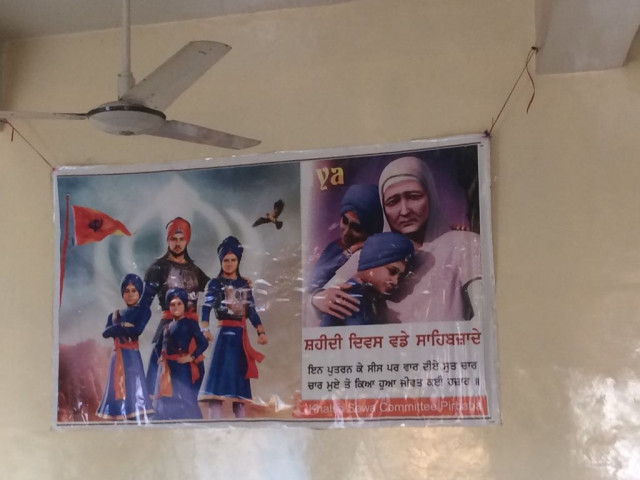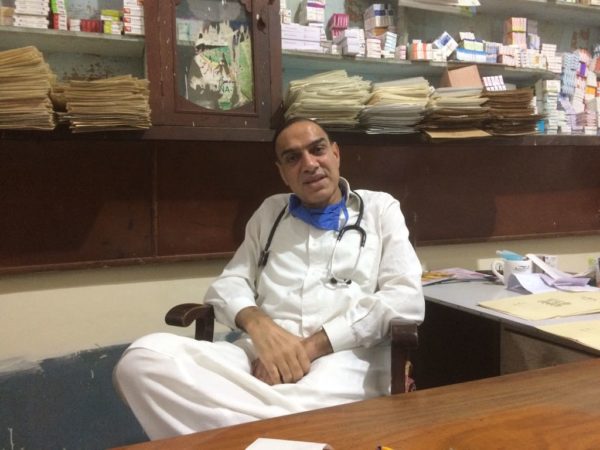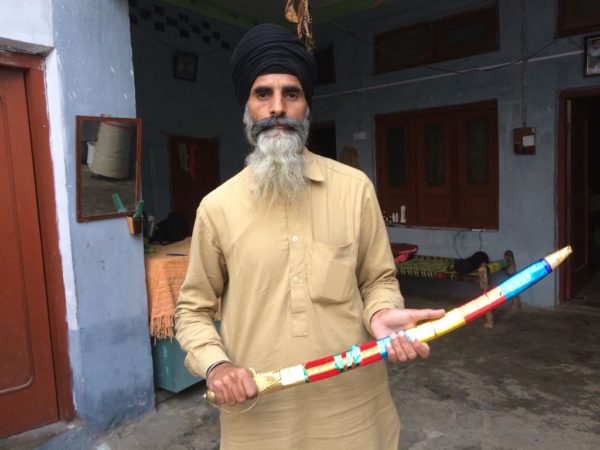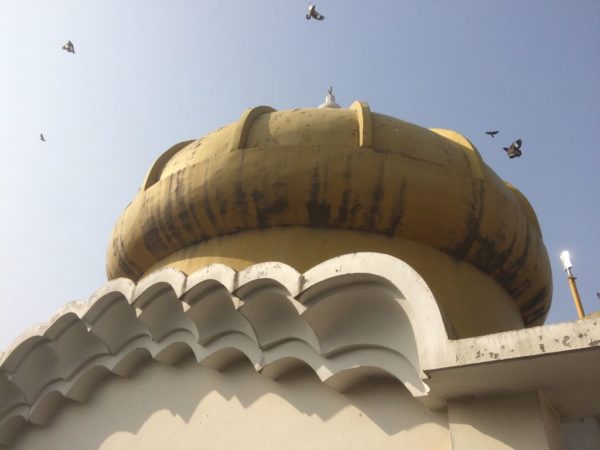In Buner’s Pacha Kalay, Sikhs are ‘integral part of society’
Most are engaged in commerce like forefathers

Khalsa Seva Committee posters at the Pacha Kalay gurdwara. PHOTO: RIAZ AHMED
Among locals, however, Kumar commands an enviable standing as a gifted doctor running a free practice. The gastroenterologist and hepatologist charges patients from neighbouring villages a nominal Rs500.
Kumar told The Express Tribune he found nothing ‘peculiar’ in electing to practice in his native place. “I secured a place in Khyber Medical College on scholarship. Graduating in 1989, I went on to specialise at a United Kingdom university on scholarship too,” he said.
The doctor said his brother was his biggest inspiration. “My brother got into a medical college in the 1950s. He was not able to attend as our financial situation was precarious. He always told me to solely focus on academics,” Kumar said.
 Mohan Kumar, who runs a free practice, pictured at his clinic. PHOTO: RIAZ AHMED
Mohan Kumar, who runs a free practice, pictured at his clinic. PHOTO: RIAZ AHMEDUpon return Kumar started working at a Buner public hospital only to tire of repeated transfers and postings. “I’m glad I quit and returned to Pacha Kalay. This is where my roots are,” he said.
The doctor said health standards in the mountainous region would drastically improve if awareness on hygiene was raised. Most health problems would simply disappear, he said.
Dentist Janam Raj’s career followed a somewhat similar trajectory. Raj also returned to Pacha Kalay after working at a Peshawar dental hospital. A Sikh-owned pharmacy is also situated near the building where both, Raj and Kumar practice. Similar career choices and a common workplace are not the only commonalities the two share. Both men, like many of their Buner coreligionists are Mona Sikhs, individuals who do not observe the Khalsa tenet of wearing one’s hair unshorn.
Barring a negligible presence across Cheena, Swari and Totalai villages in lower Buner, most Hindus of the area have adopted the Sikh faith. “I was initiated into the Khalsa in 2003,” Roshan Singh told The Express Tribune. While Singh has been baptised, his brother remains a Mona Sikh. “The younger lot, however, overwhelmingly prefers to be initiated,” he said.
 Roshan Singh, a baptised Sikh poses with a sword. PHOTO: RIAZ AHMED
Roshan Singh, a baptised Sikh poses with a sword. PHOTO: RIAZ AHMEDPacha Kalay has been home to a significant Sikh population for centuries. Around 70 Sikh families live in the village. Other clusters can be found in the Dewana Baba, Cheena and Ghorghost villages of Buner. The Hindko-speaking people are also well-versed in Urdu and Pashto. Their dialect, however, is distinct.
“Our Hindko boasts many Punjabi and Pashto loan words,” Inder Prakash, the son of a deceased community elder told The Express Tribune. Praskash’s father Kashan was extremely close to Wali-e-Swat Mian Gul Jahanzeb. An affluent man, Kashan owned the sole grain bazaar in Buner where he traded in produce after procuring it in great quantity.
“This land is sacred for us. The thought of migrating to Peshwar, Nankana (Sahib) or India has never crossed our mind,” Prakash said. Some posit otherwise. A few Sikh families fled to India as the Taliban gained ground. These include noted community elder Babu Ram.
“I travel frequently. My paths crossed with a Sikh from Pacha Kalay in New Delhi. He kept on saying how he pined for the village with tears in his eyes, Malaysia-based Khalid Bacha, who also hails from the area, said.
Locals often use the honorific seth to address Sikhs. The community’s dated affluence in the region is often attributed to their trading interests, with many claiming Sikhs eclipsed Hindu merchants in the area following the annexation of Peshawar by Maharaja Ranjit Singh.
“They were the richest in Buner. The Sikhs were not allowed to buy property by rulers of the erstwhile princely state of Swat. Otherwise, a Sikh could very well afford to buy all of Pacha Kalay. In return, they were guaranteed state protection and full freedom to trade,” villager Khalid Bacha said.
 Dome of the Pacha Kalay gurdwara rising over the village. PHOTO: RIAZ AHMED
Dome of the Pacha Kalay gurdwara rising over the village. PHOTO: RIAZ AHMEDCommunity members continue to hold a virtual monopoly over cloth trade in Pacha Kalay’s main bazaar. While most are shopkeepers, a few have ventured into the professions. These include doctors, teachers and photographers. Others own filling stations, plazas or money changing concerns.
Historically, locals looked down upon the trading class. The ‘stigma’ associated with being a ‘shopkeeper’ left the field open for enterprising Hindus and Sikhs. Things have changed over the decades with Buner Muslims turning to small business. Today, they outnumber Sikh counterparts in Buner’s main bazaar by a wide margin.
“The Sikhs are an integral part of society. They are held in great regard,” Pacha Kalay resident Nasir Ali said. He said communal harmony had largely endured due to the spirit of tolerance fostered by the erstwhile rules of Swat.
“Weddings in the area usually span three days. The first is for locals. Guests from elsewhere are entertained the following day. The third day is exclusively reserved for Sikh acquaintances,” Ali said. He added that it was not uncommon to see both, Sikhs and Muslims, at funerals too.
A now rebuilt Pacha Kalay gurdwara, razed by a mob following the 1992 Babri Masjid demolition in India, serves as the main venue for community gatherings. Hindus and Sikhs from as far as Sindh frequent the site where free food and lodging is offered to anyone in keeping with Sikh custom. The village also boasts its own cremation ground, revamped by slain adviser to chief minister Soran Singh. The family of Singh, a native of the village, relocated to Swat after his killing.













COMMENTS
Comments are moderated and generally will be posted if they are on-topic and not abusive.
For more information, please see our Comments FAQ